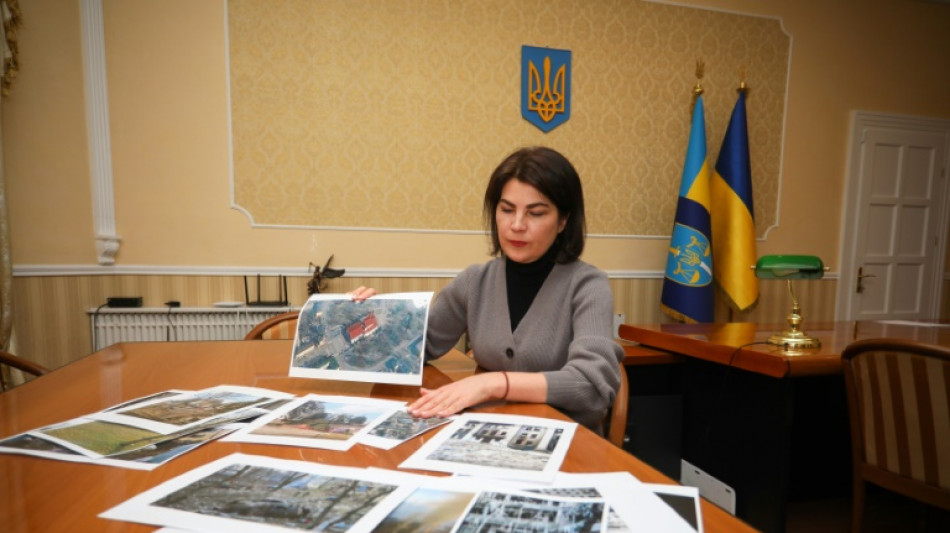

Ukraine prosecutor probes war crimes in fog of war
US President Joe Biden has called his Russian counterpart Vladimir Putin a "war criminal". But it is the job of Iryna Venediktova, Ukraine's prosecutor general, to make the case.
"Yes, we can prove it," Venediktova told AFP.
"I'd even say more. He is the main war criminal of the 21st century."
Venediktova is investigating and tallying the mounting cases of suspected crimes by Putin's invading forces.
The 43-year-old shuffles a grim sheaf of printouts: a maternity hospital wrecked by shelling; a burnt-out theatre that was sheltering children; and an ash-covered street strewn with the rubble of apartment buildings.
These are just a few of the cases she is building against Russia's commanders, ministers and Putin himself.
"He actually wants to destroy Ukraine as a state," she said, speaking from the western city of Lviv -- for security reasons, she asked AFP not to reveal her exact location.
- 'The judicial front' -
Atrocities committed in the fog of war often remain hidden from justice forever. Investigations are rare and can take years, if ever, to come to fruition.
But Ukraine is making a major effort on what Venediktova calls "the judicial front" to be "successful in the nearest future".
"Time flies very, very fast in war," she says.
As of Wednesday midday the prosecutor's office had recorded 2,401 "crimes of aggression and war crimes" and 1,516 "crimes against national security" in the first month of conflict.
There are 127 "wanted" suspects in what Venediktova calls the "anchor case" against Russia's civil and military regime.
Since the invasion began on February 24 Venediktova has been travelling the length and breadth of unoccupied Ukraine gathering evidence.
There are "before and after" satellite images of flattened buildings, interviews with captured Russian soldiers, and the testimony of refugees fleeing across the border.
"I try to be in the place where I need to be," she says.
The crimes she identifies vary enormously. There are "a lot" of cases of wartime rape; there is the indiscriminate shelling of civilian buildings; and a child who died of dehydration in a blockaded city.
The besieged port city of Mariupol is foremost in her mind. "I try to be a very cold prosecutor," she says.
"What now I see in Mariupol it's not about war, it's about genocide.
"Theatres of war have some rules, some principles. What we see in Mariupol, [are] no rules at all."
The city has been taken hostage, she says. "It's impossible to give them food, water, electricity -- and the Russian Federation exactly knows what they are doing here."
But the most upsetting case she has considered so far is of a 14 year-old boy reportedly killed in a Russian tank attack on the fourth day of the war.
On a mobile phone she shows a graphic photo of a munition round lodged in his open chest.
That, for her, was "the most powerful" case, she said, her voice trailing off.
The prosecutor's running tally shows 121 children killed so far in the war.
- Pursuing an international prosecution -
Ukraine may feel its case against Russia is strong, but the prospect of seeing meaningful justice will be complex.
Venediktova says cases will be prosecuted in Ukraine's domestic courts. But the highest prize would be conviction in an international court.
Ukraine is not a member of the International Criminal Court (ICC) but it has accepted its jurisdiction in the past, leaving the door open to a tribunal.
ICC prosecutor Karim Khan has opened an investigation after 41 other member states referred Ukraine's case to his office.
"There is a reasonable basis to believe that both alleged war crimes and crimes against humanity have been committed," he said earlier this month.
However, because Russia is not an ICC member it cannot adjudicate on the more straightforward case of "crimes of aggression".
The ICC also does not conduct trials in absentia, and the prospect of seeing Russian suspects transported from the pariah state to the dock at the Hague seems remote.
Venediktova is optimistic, however.
She believes there is a strong case for Russia to face charges of war crimes, crimes against humanity and genocide at the ICC.
Her team is collecting evidence so Khan's prosecution "will be successful" if and when Ukraine has its day in court.
"Nobody knows what will be in the future," she says.
F.Lecce--IM




